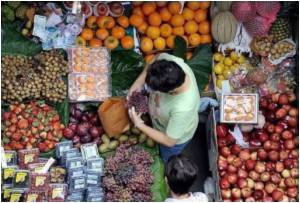Economically hit Americans eat less and less fruits and vegetables, it seems.

The bureau has sought to utilize information from the Behavioral Risk Factor Surveillance System (1990-2007) to explore the relationship between the risk of unemployment and the consumption of various healthy and unhealthy foods.
The BRFSS, the largest telephone-based health survey available, has tracked health conditions and risk behaviors for adults 18 years of age and older in the US. The survey is conducted by state health departments in collaboration with the Centers for Disease Control.
The sample size is in the region of about 1.25 million. A higher unemployment rate in the respondent’s state of residence is associated with lower levels of consumption of fruits, juice, carrots, green salad, and vegetables.
A higher risk of unemployment is associated with reduced consumption of fruits and vegetables and increased consumption of “unhealthy” foods such as snacks and fast food, the bureau says in its paper. The impact may also be somewhat higher among married individuals and older adults.
The frequency of fruits and vegetables consumption is generally lower among males, with the exception of fruit juice. Healthy food consumption also increases with education, consistent with the hypothesis that educated individuals are more allocatively efficient and tend to choose healthier inputs.
Advertisement
Some significant racial and ethnic differences also emerge. Blacks tend to consume fruit juice more frequently and vegetables less frequently, relative to whites, whereas individuals of other race are generally found to have a higher frequency of all forms of healthy food consumption. Individuals of Hispanic origin also generally consume more servings of fruits and vegetables.
Advertisement
The Patient Protection and Affordable Care Act, which goes into effect in 2014, views mental health coverage as an essential health benefit, and requires insurers to provide coverage at parity with coverage provided for other medical conditions. Such coverage, by improving access to mental health services, may also moderate declines in healthy behaviors during recessions, the bureau seems to hope.
Source-Medindia














